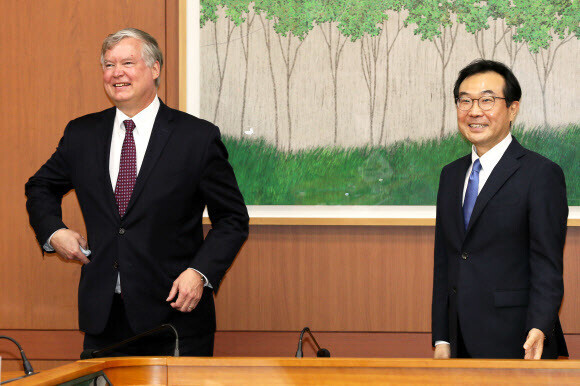hankyoreh
Links to other country sites 다른 나라 사이트 링크
[Editorial] Biegun’s message is a signal for S. Korea to take the lead in inter-Korean relations

While visiting South Korea on July 8, US Deputy Secretary of State Stephen Biegun said that “the United States strongly supports inter-Korean cooperation, and we believe this plays an important component in creating a more stable environment on the Korean Peninsula.” While Biegun, as the US’ special representative for North Korea, underlined the US’ commitment to negotiations with the North, he didn’t bring a concrete message that could overcome the impasse that has persisted since the North Korea-US summit in Hanoi last year. While that’s too bad, Biegun’s emphasis on the importance of inter-Korean cooperation is meaningful. That makes it even more urgent for the South Korean government to take the lead in improving inter-Korean relations.
Following his meeting with Lee Do-hoon, South Korea’s special representative for Korean Peninsula peace and security affairs, at the Ministry of Foreign Affairs, Biegun told reporters, “We look forward to fully supporting the government of the Republic of Korea [South Korea] as it advances its goals with North Korea on inter-Korean cooperation.” Biegun’s remarks represent a considerable improvement in the US government’s position, considering that it has hobbled inter-Korean cooperation on multiple occasions by insisting that such cooperation must keep pace with progress on denuclearization. We hope that the US’ position will not end in words, but lead to action.
The first thing the South Korean and American authorities should do is swiftly devise a concrete plan for overhauling the operations of their working group, which has been criticized for blocking progress on inter-Korean relations. We also think they need to greatly downsize or cancel their joint military exercises scheduled for next month. Considering how COVID-19 is spreading in the US, it’s undesirable for thousands of American soldiers to travel to South Korea for the exercises; furthermore, those exercises don’t help manage the situation on the Korean Peninsula.
The US needs to recognize that it can’t change the situation through empty words about wanting to resume negotiations with the North. Trump suggested that he feels positively about holding a third summit with North Korea when he said on July 7 that “I would do it if I thought it was going to be helpful,” but that remark alone won’t bring the North back to the table for dialogue. Rather than unilaterally calling on North Korea to take steps toward denuclearization, the US needs to offer a concrete roadmap for moving gradually toward denuclearization and easing sanctions on the North according to the principle of “action for action.”
The time has come for the South Korean government to take the lead in improving inter-Korean relations to ease tensions on the Korean Peninsula and in arranging for the resumption of North Korea-US negotiations. Military tensions have remained high since North Korea’s demolition of the inter-Korean joint liaison office last month, and the US, which has a presidential election coming up in November, doesn’t seem capable of preparing for serious dialogue with the North. Under these circumstances, it’s critical for South Korea’s new foreign policy and national security team to come up with a bold solution. Needless to say, the US ought to actively support that solution.
Please direct comments or questions to [english@hani.co.kr]

Editorial・opinion
![[Editorial] Does Yoon think the Korean public is wrong? [Editorial] Does Yoon think the Korean public is wrong?](https://flexible.img.hani.co.kr/flexible/normal/500/300/imgdb/original/2024/0417/8517133419684774.jpg) [Editorial] Does Yoon think the Korean public is wrong?
[Editorial] Does Yoon think the Korean public is wrong?![[Editorial] As it bolsters its alliance with US, Japan must be accountable for past [Editorial] As it bolsters its alliance with US, Japan must be accountable for past](https://flexible.img.hani.co.kr/flexible/normal/500/300/imgdb/original/2024/0417/6817133413968321.jpg) [Editorial] As it bolsters its alliance with US, Japan must be accountable for past
[Editorial] As it bolsters its alliance with US, Japan must be accountable for past- [Guest essay] Amending the Constitution is Yoon’s key to leaving office in public’s good graces
- [Editorial] 10 years on, lessons of Sewol tragedy must never be forgotten
- [Column] A death blow to Korea’s prosecutor politics
- [Correspondent’s column] The US and the end of Japanese pacifism
- [Guest essay] How Korea turned its trainee doctors into monsters
- [Guest essay] As someone who helped forge Seoul-Moscow ties, their status today troubles me
- [Editorial] Koreans sent a loud and clear message to Yoon
- [Column] In Korea’s midterm elections, it’s time for accountability
Most viewed articles
- 1[Column] The clock is ticking for Korea’s first lady
- 2Samsung barricades office as unionized workers strike for better conditions
- 3[Editorial] When the choice is kids or career, Korea will never overcome birth rate woes
- 4[News analysis] After elections, prosecutorial reform will likely make legislative agenda
- 5S. Korea, Japan reaffirm commitment to strengthening trilateral ties with US
- 6Japan officially says compensation of Korean forced laborers isn’t its responsibility
- 7Why Israel isn’t hitting Iran with immediate retaliation
- 8[Editorial] Does Yoon think the Korean public is wrong?
- 9[Guest essay] How Korea turned its trainee doctors into monsters
- 10[Guest essay] Amending the Constitution is Yoon’s key to leaving office in public’s good graces